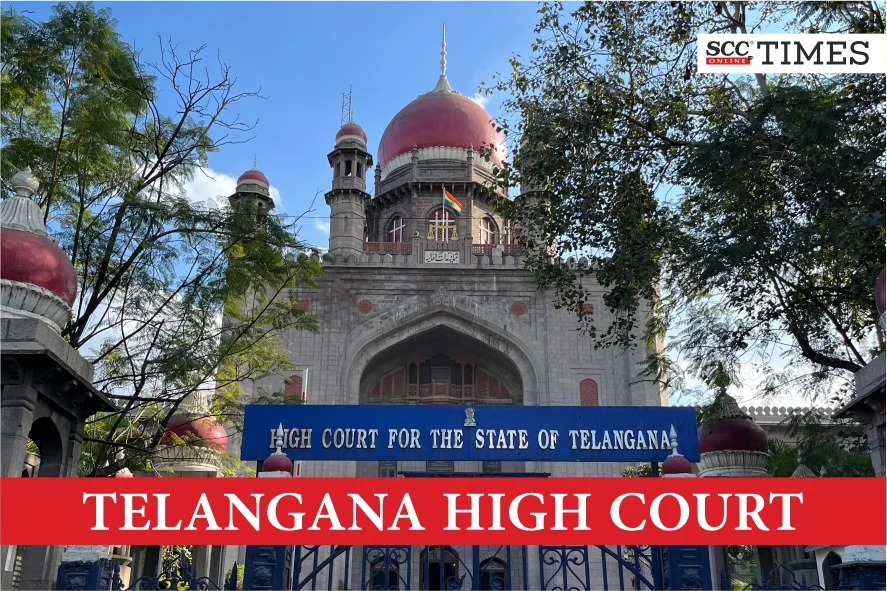Telangana High Court: The petitioner approached the Court seeking to pass an order/direction more so in the nature of writ of Mandamus to declare that Respondent 2’s action in refusing passport services to petitioner vide order dated 30-1-2024 (‘impugned order’) on account of pendency of a case before the XII Additional Chief Metropolitan Magistrate, Hyderabad as illegal, high handed and arbitrary apart from being in violation of petitioner’s rights under Articles 14, 19 and 21 of the Constitution and consequently set aside the order dated 30-1-2024 and direct Respondent 2 to renew petitioner’s passport for ten years.
Surepalli Nanda, J., opined that pendency of a criminal case could not be ground to deny passport facilities to petitioner since petitioner’s right to personal liberty not only included petitioner’s right to travel abroad, but also petitioner’s right to possess or hold a passport. The Court directed Respondent 2 to re-consider petitioner’s application and pass appropriate orders for issuance of passport for a period of ten years.
Background
Petitioner submitted that he had a valid passport issued on 9-8-2023 which was valid up to 8-8-2024 and as petitioner’s passport was due to expire, an application for its renewal was filed dated 25-1-2024 and Respondent 2, vide letter dated 30-1-2024 sought clarification from petitioner for issuing the renewed passport on the ground of adverse police report, since petitioner was involved in a criminal case under Sections 420, 468, 471 of the Penal Code, 1860.
The impugned order dated 30-1-2024 was issued by Respondent 2 intimating that it was decided by the competent authority to refuse passport services to petitioner under Section 5(2)(c) of the Passports Act, 1967 (‘the Act’), to be read with Section 6(2)(f) of the Act, in view of pendency of a case against petitioner and further Respondent 2 sought for, acquittal order from the case or obtain permission to travel abroad from the same Court, where the criminal case was pending for re-considering petitioner’s application. Aggrieved by the said proceedings dated 30-1-2024 issued by Respondent 2, petitioner filed the present writ petition.
Analysis, Law, and Decision
The Court noted that the impugned order dated 30-1-2024 issued to petitioner by Respondent 2 indicated that the passport services to petitioner were denied by on account of pendency of case under Sections 420, 468, 471 of the IPC, and that petitioner was falsely implicated in the said case and that issue pertains to certain immovable property which belonged to his relative and that petitioner was always available to the police and would cooperate with the investigation.
The Court opined that pendency of a criminal case could not be ground to deny passport facilities to petitioner since petitioner’s right to personal liberty not only included petitioner’s right to travel abroad, but also petitioner’s right to possess or hold a passport. The Court opined that the act of Respondent 2 was contrary to the procedure laid down under the Act and the principle laid down by the Supreme Court in Vangala Kasturi Rangacharyulu v. CBI, 2021 SCC OnLine SC 3549.
The Court relied on Sumit Mehta v State (NCT of Delhi), (2013) 15 SCC 570, wherein the Supreme Court observed that “the law presumes an accused to be innocent till his guilt is proved. As a presumable innocent person, he is entitled to all the fundamental rights including the right to liberty guaranteed under Article 21 of the Constitution”. The Court also relied on Maneka Gandhi v. Union of India, (1978) 1 SCC 248, wherein the Supreme Court held that “no person can be deprived of his right to go abroad unless there is a law enabling the State to do so and such law contains fair, reasonable and just procedure”.
This Court in Ravi Kumar Panasa v. Union of India, W.P. 11674 of 2022, while interpreting the provisions of the Gazette Notification issued by the Central Government vide GSR No.570(E) dated 25-8-1993 (‘the Gazette Notification’) wherein instructions were issued to renew the passport only for a period of one year, in case where criminal cases were pending, if no time frame was mentioned by the Courts; and Rule 12 of Passport Rules 1980 (‘the 1980 Rules’), had held that Passports should be renewed for a period of ten years in accordance with Rule 12 of the 1980 Rules. This Court took a similar view in Venkata Padmaja Polisetti v. Union of India, W.P. 17965 of 2023.
Thus, the Court allowed the writ petition and set aside the impugned order dated 30-1-2024 passed by Respondent 2. The Court directed Respondent 2 to re-consider the application dated 25-1-2024 of petitioner and pass appropriate orders, in accordance with law for issuance of passport for a period of ten years, under Section 10 of the Act and under Rule 12 of the 1980 Rules, without reference to the Criminal Proceedings pending against petitioner and the Gazette Notification.
[Venkata Siva Kumar Yadhanapudi v. Union of India, 2024 SCC OnLine TS 402, Order dated 14-3-2024]
Advocates who appeared in this case :
For the Petitioner: S. Nagesh Reddy, Counsel
For the Respondents: A.S. Vasudevan, Counsel








